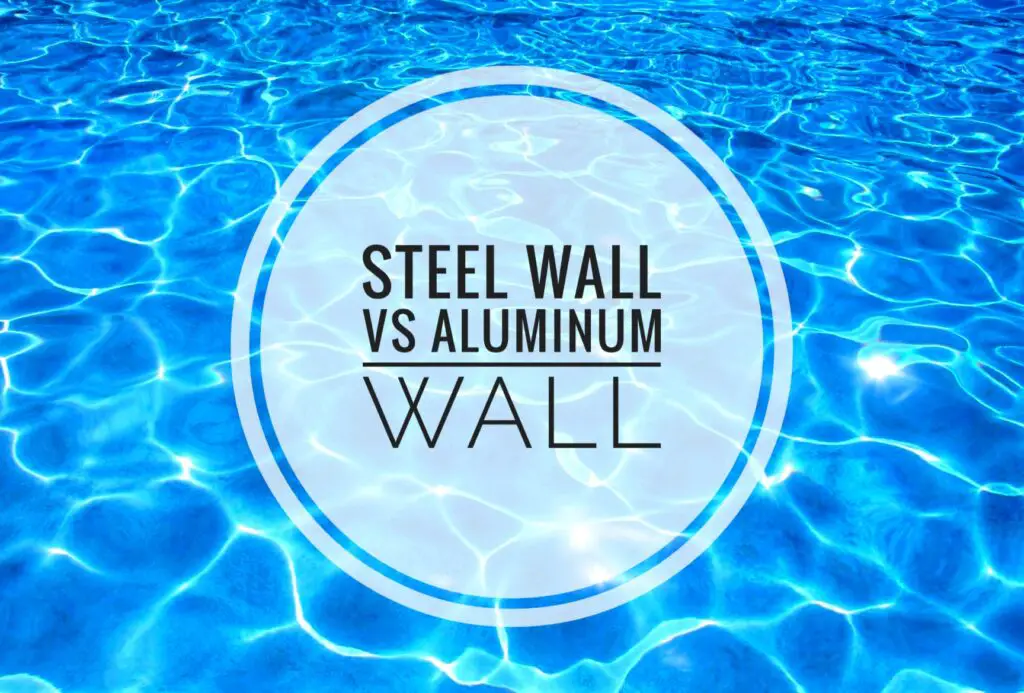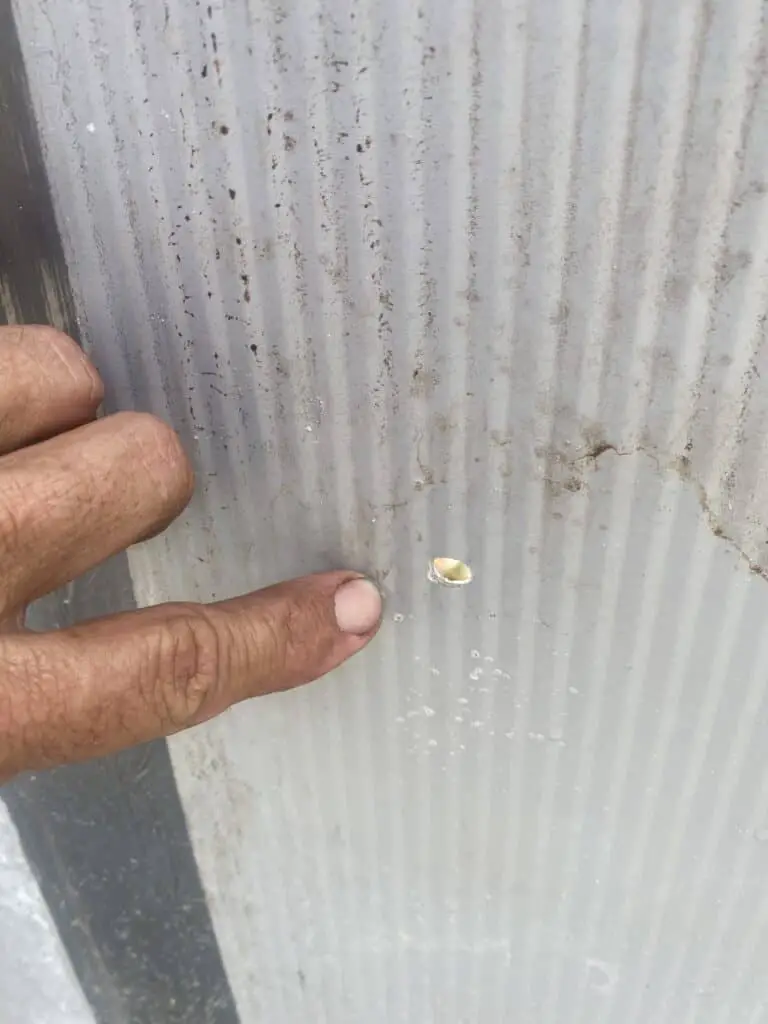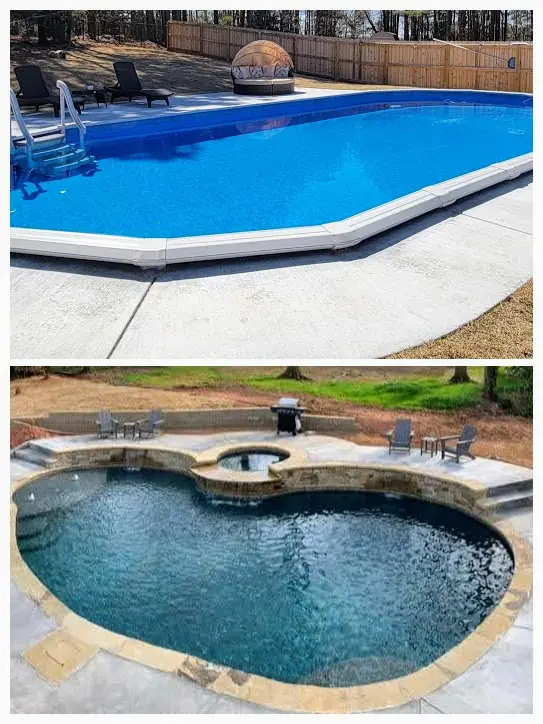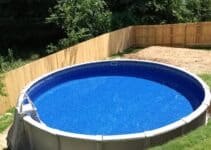
When deciding which above ground swimming pool to buy, the choice of getting a steel wall or an aluminum wall pool may come into play. This article will cover all the pros and cons of getting a steel or aluminum walled above ground pool.
Although they usually cost more, above ground pools with aluminum walls are not necessarily better or last any longer than the more common steel walled pools. This is because aluminum walls can corrode too.
STEEL WALL ABOVE GROUND POOLS PROS AND CONS
Out of all the metal walled above ground pools, more than ninety percent of them have walls made of steel. This is because steel works well for above grounds. They are strong, durable, long-lasting, and less expensive of a material. Here are some positives and negatives to choosing a steel-walled above ground pool.
Steel costs less
When I started installing pools in the eighties, you had two main choices. You could buy a cheap one or you could buy a really expensive one. Now, like everything else in the world, you have a lot more to choose from. And the price range now goes from super cheap (Intex/Coleman) soft-sided throwaways, all the way to expensive thick extruded aluminum slotted-walled pools designed to go partially in the ground and last almost forever.
The above grounds that most choose to get are in the middle range of the extremes mentioned above. And in this common range, steel walls dominate the market. Part of this reason is steel-walled above ground pools, as a general rule, cost less than a comparable aluminum walled pool.
Steel is stronger
Steel walls weigh a lot more and are a lot more rigid than aluminum walls. This is an advantage in keeping the shape of the pool if there are any issues with the install. Steel walls are also much less likely to crease or bend during the install. This is especially beneficial with self-installs as things like wind and inaccurate bottom track dimensions can cause a lot of wall drama during the install.
Steel walled pools can have a stainless steel service panel
Service panels made of stainless steel, in my opinion, are the best option you can get with an above ground pool. Most pool models don’t have this option, but they should.
Only some steel-walled above ground pools come with stainless panels. Even though an aluminum walled pool could have one, they never do. I have NEVER seen an aluminum walled pool come with a stainless steel service panel. Some will have a service panel, but they are all made of the same aluminum as the rest of the wall. This is a waste of money. You can read about the benefits of a stainless steel service panel here.
Steel walled above grounds are better for installing partially in the ground
This is a big one! It has become very common for people to bury their above ground pool partially (usually halfway) in the ground. This makes for a bigger install job, but a nicer finished product as the pool won’t be as high in the yard.
The rigidity of the steel wall is good for this as the wall. It will be in the ground some. It will be less likely to cave in years later when it comes time to drain the pool and replace the liner.
There are more pool models made of steel. More to choose from.
If you’re set on getting an aluminum walled pool, you will have a lot less to choose from in terms of the different specs of the pools.
Above grounds come in three heights, different width top rails and uprights, different colors and frame designs, and chooses of resin, steel, or aluminum parts. With most models made with steel walls, you will have a lot more options to choose from.
Steel can rust
Under the right circumstances, all metals will corrode. When it comes to steel, we call corrosion, rust. All above ground pools (except the cheap soft-sided ones) need metal to ensure that all the weight of the water stays in the pool and not burst out into the yard.
I heard of a new pool that has a resin wall instead of metal but I have yet to see one. It would be great if they do start making above grounds with non-metal walls. But I wouldn’t trust one until they are around and proven for a good long while. For now though, lasting above ground pools have to be made with metal walls. And they all, including steel, can corrode.
ALUMINUM WALLED POOLS PROS AND CONS
Aluminum costs more
Although the price for the raw material, aluminum has come down some. It still costs more to make a pool wall with aluminum. This means it costs more to buy a pool with aluminum.
What I am talking about here is the common, standard, continuous roll wall. There is a slatted extruded aluminum wall that comes in sections, but that is a completely different product. And it cost a whole lot more.
Aluminum walls are flimsy and weaker
During the installation, you have to be more careful with an aluminum wall. Aluminum walls are more likely to get crease marks, come out of shape, and blow over during a high wind.
If you are planning on DIYing your pool install with an aluminum wall, make sure you secure the wall well during install. Don’t roll it out if there is any wind.
For this reason, I don’t recommend having a continous roll aluminum wall pool when going semi-inground or when installing on extremely uneven ground.
Aluminum walled pools do NOT come with stainless steel service panels
Stainless steel service panels are great because they can prevent the pool from rusting and splitting where the skimmer and return are in the wall of the pool.
Aluminum walled pools don’t have stainless panels because they are sold as walls that won’t rust or corrode. This is completely inaccurate. Some will come with service panels made of the same aluminum as the rest of the wall. This is a waste of time and money. Only service panels made of stainless steel are effective at preventing the wall from one day blowing out and killing the pool.
Continuous roll aluminum walls are NOT recommended for semi-inground installation
I have to say “continuous roll” because there are more expensive pool models that are made specifically to go in the ground. And they are made will aluminum walls but they are very thick and come in sections. They also cost thousands more.
Regular aluminum walls for above grounds are too light and flimsy to go in the ground well. You can put them partially in the ground. But will have to take extra precautions during the install and when backfilling.
Most aluminum walled above ground pools are upgraded models
This can be ok for you if you are planning on getting a nicer more expensive pool. If you are wanting something more basic though, you won’t find many less expensive models with aluminum walls.
Aluminum can’t rust, but it corrodes

I say it like this because some people think there’s a difference between rusting and corroding. Under the right conditions, aluminum walls will corrode and can eventually fail to hold the water just like steel will. The only real difference is that when aluminum corrodes, it makes a bunch of tiny white pinholes.
THE BIGGEST REASON WHY POOL RETAILERS OFFER ALUMINUM WALLED ABOVE GROUND POOLS
Using aluminum as the material for above ground pool walls is ok, but is not as strong or rigid, and cost more than steel. So, why do they make pools with aluminum walls and why do some retailers choose to sell them over steel?
Pool retailers sell aluminum walled pools as ones that won’t corrode. This is not at all true!
Given the right conditions, continuous roll aluminum walls for above ground swimming pools will corrode. And if those conditions continue, an aluminum wall will corrode to the point of losing its ability to hold the water, and the wall will split. This is with a steel wall.
The only real difference is that steel walls will rust in big areas that look really bad while aluminum walls will turn a white color and create tiny pinholes that get bigger and bigger.
Those pinholes in the aluminum may not look as ominous as the big reddish-brown rusty sections of a steel wall, but each wall will fail just the same. This is why I don’t think it’s worth spending the extra money on aluminum.
If you are concerned with rust or corrosion, get a stainless steel service panel and an all resin framed pool. That will be the best you can do to prevent corrosion from killing your pool.


My aluminum wall has small corrosion holes in areas where there is no leak as well as an area where there was a leak. All areas are at lower side of pool wall within a couple of inches of the ground suggesting it has something to do with the steel track it is mounted in. As a marine engineer for 30+ years and doing boiler water chemistry, I can’t see pool water as being the culprit being the pH it is kept at (7.2 to 7.4). There is no other metal in contact with the pool wall. Apparently I have one upper hole where I think an animal tried to climb out of pool and scratched the liner thru and had been leaking or maybe the wall spot corrosion caused a projection from the crusty oxidation to puncture the liner. I found that while brushing my hand over it; while wiping off the persistent algae growth or whatever is being aerosolized over us; and it was quite sharp. I figure a piece of aluminum rolled flashing glued and protectively taped over the holed areas should work as most of the structural integrity of the wall seems intact. Hope to hear back from you on any differences in opinion.
I think your solution is the right one as the only thing you can do is protect the liner from the areas of corrosion. And I agree that the water itself is not the reason for the corrosion. In my experience and long-term observation, moisture is almost always the cause. I can usually see corrosion based on where water entered between the liner and wall(if I can see where the leak was).
In your case, I don’t think the leak up high (from the animal) caused your low corrosion. Something else most likely allowed a layer of water to “hang out” between the liner and wall in that low area.